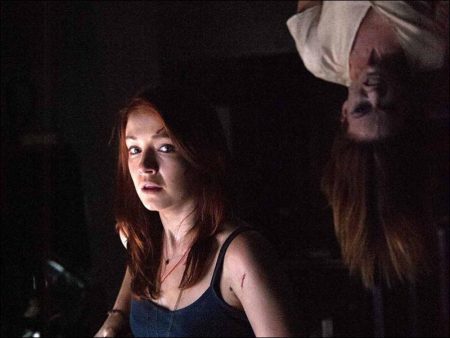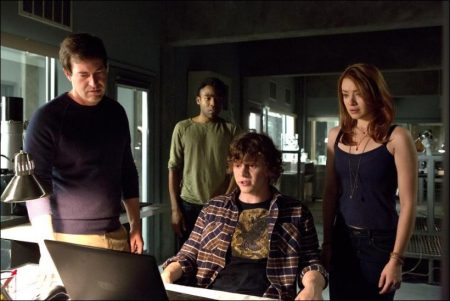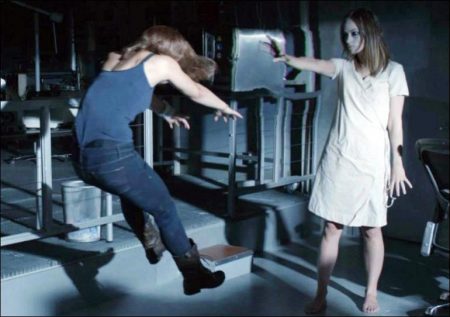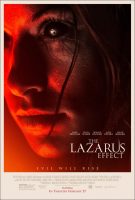Tagline: Evil will rise.
A group of researchers led by Frank (Mark Duplass) and his fiancee Zoe (Olivia Wilde), who’ve achieved the unimaginable- bringing the dead back to life. After a successful, yet unsanctioned, trial on a newly deceased animal, the team is ready to unveil their breakthrough to the world. When the dean of their university learns of their underground experiments, their project is unexpectedly shut down and their materials confiscated.
Frank, Zoe and their team (Donald Glover, Sarah Bolger and Evan Peters) take matters into their own hands, launching a rogue attempt to recreate their experiment, during which things go terribly wrong and one of their own, Zoe, is horrifically killed. Fueled by terror and grief, Frank pushes them to do the unthinkable: attempt to resurrect their first human test subject.
Initially, the procedure appears a success, but the team soon realizes something is wrong with Zoe. As her strange new persona reveals itself, the team quickly becomes stuck in a gruesome reality. They are no longer faced with the question of whether they can bring someone back to life- but rather, the wrath of her return.
“You have no idea what you’ve done… but you will.”
For time immemorial, humans have sought the one power that has escaped our grasp: to reverse the haunting finality of death. But just how perilous might it be to mess with the most basic law of nature? What if exploring the mysterious gap between life and death opens the gateway to lurking evil we never imagined? Could it be that the wondrous possibility of reversing death is actually a path to the darkest corners of the human psyche and the very height of mortal fear?
That is the premise behind The Lazarus Effect, the new film from Blumhouse Productions, the producers of such original hit horror franchises as The Purge, Insidious and Sinister. The gripping, thought-provoking thrills begin with a group of renegade medical researchers who believe they may have stumbled on a breakthrough drug that could one day resurrect recently deceased patients. But when a lab accident takes the life of one of their own, they decide to rush into a spontaneous experiment, bringing her back to life in an extraordinary medical triumph… and unleashing forces far beyond their comprehension.
Corporeal reanimation has long been part of mythology, from zombies to Frankenstein, but it has also been an enduring scientific quest. Emergency medicine has come so far that, in some cases, people are being resuscitated from flat-lined hearts even after many hours in a state incompatible with life. So what if we could extend that period to days or weeks… or beyond?
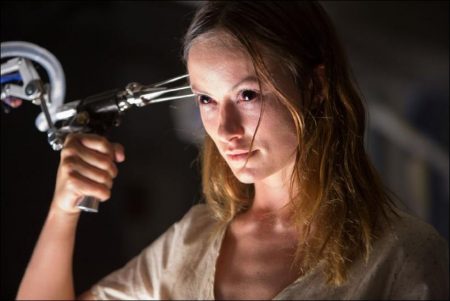
In the film, the Lazarus Project Lab has been probing that daring question for a while, with promising results, at least with a dog named Rocky. They could be on the verge of the biotech coup of the century. But even before they have collected the necessary data to proceed, they are forced to dive into the unthinkable: testing their serum not only on a human subject, but their beloved friend.
Now, they know they can bring a human being back from clinical death. But what they do not know is where they have brought her back from – and how they are going to survive her wrath. Without ever leaving the lab, The Lazarus Effect explores a nightmarish realm between the boundaries of the life we know and what comes after.
“The Lazarus Effect is definitely a horror film but there are also elements of a medical thriller and Sci-Fi,” says director David Gelb, who turns from his award-winning documentary Jiro Dreams of Sushi to the realm of mounting fear in this new film. Working with an accomplished cast headed by Mark Duplass and Olivia Wilde, Gelb went all in, diving into all the obsessive and often petrifying questions evoked by the prospect of manipulating the most unknowable human reality of all: death.
The story builds on a mysterious medical reality that has resulted in more than 3 dozen documented cases of the so-called Lazarus Phenomenon – when a patient spontaneously returns to life even after resuscitation has failed, named for the Biblical figure who rose from the dead. The incidents have been shocking and macabre. In 2010, a funeral worker in Colombia discovered a 45 year-old woman’s body, long declared dead, starting to move shortly before burial. In 2013, an Ohio man coded for 45 minutes and doctors told his son he was gone; but when the son came to say goodbye, a slight signal reappeared on the heart monitor and the man suddenly revived. Then there is recent case of a dog euthanized twice at an animal shelter in the Ozarks, only to be found sitting up in his kennel the next morning. (The dog was soon adopted … and named Lazarus.)
While scientists don’t know precisely what might trigger a stopped heart’s electrical system to restart, some have been inspired to explore whether this “Lazarus Effect” can be harnessed through medical technology – and that is where the scientists in The Lazarus Effect begin, never imagining the terrifying place they’ll end up.
“I loved the idea of really exploring the concept of being brought back to life,” says Gelb. “What would you experience while you were gone? How would you be different when you came back? And what might you potentially bring back with you? The young scientists in our film set out to give patients and loved ones hope, but they discover that there can be horrible consequences to playing with the power of life,” says Gelb. “As events begin to unfold, the story takes a sharp turn into becoming an absolutely terrifying thrill ride where you don’t know what’s going to happen, you don’t know who the next character to disappear is going to be, and the scares are pretty intense.”
This idea of returning from the dead has long been a human fascination and source of mythology reaching all the way back to the beginning of recorded history. One of the most famous instances is noted in the Bible, when Lazarus himself was brought back from the dead in John 11. Even further back, in Ancient Greece, the celebrated philosopher Plato documented the story of Er — a Greek solider who died in battle.
After ten days, Er’s body had not begun decomposing and on the twelfth day, he rose from the dead. Plato’s text documents Er’s account of everything that happened to him when he died and what he came to believe happens in the afterlife.
Even today, a news report will surface about a person coming back to life after being pronounced dead. In 2007, a Venezuelan man had been declared dead but came back to consciousness just as an autopsy was about to be performed on his body. In 2012, there were reports of a dead man in Yemen who jolted back to life at his own funeral just as he was being placed in his grave. Most recently, there were even rumors and urban legends in Africa about people coming back to life after dying from Ebola.
Not Your Father’s Frankenstein
For producer Jason Blum, whose Blumhouse Production specializes in original horror (Paranormal Activity, Sinister, The Purge, Insidious, Oculus) along with award-winning dramas (Whiplash, “The Normal Heart”), the one rule to the modern horror film is that there should be no rules. “The signature thing for us in horror is that we want every film we make to feel different,” he says. “Is there something about this story you haven’t seen before? That’s what interests us.”
In the case of The Lazarus Effect, the story meshed with a longtime interest Blum has had in rejiggering perhaps the most classic horror film concept of all: the Frankenstein tale of a person who regains precious life, but at the horrific cost of not being quite human anymore.
“I really thought The Lazarus Effect was Frankenstein retold,” says Blum. “Of course, in this movie the ‘monster’ is a woman, but that’s part of what attracted me. And I liked that The Lazarus Effect is not so much about the question of how you bring someone back to life – but more getting into the bigger questions of what exactly happened to her when she died, where did she journey when she was gone and how has it changed her?”
Those questions also intrigued executive producer Matt Kaplan, who first began developing the film at Lionsgate from a screenplay draft by Luke Dawson (Shutter), before founding Chapter One Films. Dawson had forged a team of brilliant, if offbeat, medical researchers working in secret to crack the code of life after death. They were brash, tech-savvy, biotech pioneers very much of the 21st Century – but engaged in one of the most ancient, and danger-fraught, biological quests of all.
“We fell in love with this story because it felt so different for contemporary horror,” says Kaplan. “It wasn’t a slasher film or a poltergeist film – it had a concept that was a more Sci-Fi but still full of the potential for exciting scares. The question of what could come back with you if you come back from the dead was an exhilarating one to explore.”
Also coming aboard was veteran horror and drama producer Cody Zwieg, whose films include the Wes Craven classic The Hills Have Eyes, The Last House on the Left and the Sci-Fi horror thriller Apollo 18. Says Zwieg: “The best horror films are never just about scares and blood – they also bring in deeper, more primal questions about the roots of human fear. The Lazarus Effect starts with a concept that is completely relatable. Everyone has experienced loss, everyone has things from the past that haunt them and I think everyone is intrigued by that question of ‘if you could bring someone back from death, would you?’ Of course, that question could go in a lot of different directions … but we take it into a dark and frightening version of all that might result.”
Zwieg’s excitement magnified when the team decided to thrust a female scientist into the afterlife, a twist on the Frankenstein myth that gave it a contemporary kick. “It was an idea that electrified everything, pardon the pun,” he recalls. “I loved the idea of this brilliant, beautiful woman who really is the moral backbone of the laboratory undergoing a shocking transformation.”
It was Kaplan who brought in screenwriter Jeremy Slater (The Fantastic Four) to explore these fresh ideas – and also a most unexpected choice for director: David Gelb, whose debut feature, Jiro Dreams of Sushi, was a widely acclaimed documentary ode to the skills of an 85 year-old Japanese sushi master. That film was lyrical and emotional, but Kaplan was sure Gelb had the versatility to do something completely different – and in his own way.
“I had been watching David from afar since he was a promising student in film school, and then, once he made Jiro Dreams of Sushi, I eventually became friends with him,” Kaplan explains. “I knew he was more than capable of switching to a narrative feature. He immediately came in with lot of ideas and a whole visual presentation. He really knew and understood the type of film we wanted to make.”
Blum says Gelb won him over. “I might have been reluctant to give a horror movie to a guy who did a great movie about sushi,” the producer muses. “So I really give Matt credit for picking David, and really supporting and pushing him. David did a great job and he also helped attract this high-caliber cast who were drawn to him as a cool artist known for doing things in interesting ways.”
For Zwieg, Gelb was an exciting choice. “I’m always interested in directors who bring a strong vision – and when you watch Jiro Dreams of Sushi, it’s not only visually brilliant, it also showcases some amazingly powerful storytelling. David might seem an unusual choice, but he came in with such smart ideas, ready to put his own stamps on things. He had a great interest in the science of the Lazarus Phenomenon, but also in the characters, and he brought influences from beyond the genre. He revitalized our notion of what this movie could be, pushing us to make it more surprising.”
Once he came on board, Gelb worked closely with Slater to refocus the story, asking him to turn it inwards, to explore the deep-seated layers of psychological fear that swirl beneath the surface of our curiosity about the afterlife. Rather than focusing on external demons from a literal Hades, he asked Slater to consider the idea that the dark, persistent memories that stalk the shadowy corridors of the human mind – our inner demons — are the most frightening hell of all.
“David wanted to delve into the realms of memory and childhood trauma, to explore what the process of dying might actually do to someone’s mind, especially if they had unresolved issues. The demons Zoe brings back with her are childhood demons that are now out of control,” Slater explains. “David pushed things in a rich psychological direction that gets very intense.”
Gelb and Slater also delved into the moral quandaries of tearing a departed soul from its natural path. When Zoe returns tormented by a ghastly reality in which her scariest memory plays over and over and her instincts are raging out of control, the team is faced with the idea that they’ve made a terrible mistake by bringing her back. “We raise the question of whether you have a moral obligation to not drag someone out of wherever they have gone, heaven or hell, without permission, even if you’re doing it to reunite with someone you love,” says Slater.
Zoe has had no say in her resurrection, but she exhibits signs of being profoundly changed by it. Not only is she caught in a cycle of fiendishly realistic nightmares; she also exhibits side effects from the life-giving serum – an accelerated brain forging new neural pathways at unprecedented speed, rendering her with telepathic and telekinetic powers beyond her ability to restrain.
Meanwhile, the researchers face worldly threats – knowing their serum could be the most priceless acquisition ever for a biotech company. “Once they reanimate the dog, they are thinking we have to stake our claim to this serum before a Big Pharma company comes swooping in to take it away. So the group is already in a race against time, when it goes disastrously wrong,” says Slater.
Each of these strands of the story combines to push the characters to their individual edges. As the new script progressed, Gelb zeroed in on creating an eclectically fun group of scientists who don’t play by the rules: Frank, the lab’s strong-minded, resolute leader; Zoe, his cautious fiancee, who falls victim to a terrible accident; Niko, the computer whiz; Clay, the organically brilliant stoner; and Ava, the videographer documenting the experiments. Bonded as they are to one another in their scientific goal, they each react to crisis in their own ways, breeding dissension in their ranks.
“At the start, you’re really rooting for these researchers to succeed. But as things begin to unravel, the divisions between them get sharper and sharper,” says Gelb. “Frank is 100% committed to this experiment, but at the expense of considering the moral ramifications. Meanwhile, Zoe has a more theological perspective. She’s excited by the idea of helping people, but she has reservations about the lines between right and wrong. And when Zoe dies, they all start to see that the consequences of breaking the boundaries between life and death might go far beyond scientific knowledge.”
Screenwriter Slater says that despite the horror that befalls the group, he can understand why it would be impossible for scientists to resist temptation. “I can think of people that I’ve lost in my life that I would use this serum on in a heartbeat just to have one more minute with them, one more chance to really say goodbye,” he observes. “I’m sure everyone who sees this movie will have their own unfinished stories where you wish you could have one more moment to get closure. But the question always just under the surface is: is messing with death going too far?”
These provocative questions drew an eclectic mix of rising stars to The Lazarus Effect. To portray the film’s “dream team” of offbeat scientific pioneers, Gelb sought actors equally as full of energy and smarts, and found it in a quintet comprised of Mark Duplass, the comic actor, writer and co-creator (with his brother) of HBO’s lauded “Togetherness,” who highlights a different side here; Olivia Wilde, the rapidly rising star seen in Rush, Tron: Legacy and television’s “House”; Donald Glover, who does a 180 from his role on the hit comedy series “Community”; Evan Peters, known for his roles in Kick-Ass, X-Men: Days of Future Past and the acclaimed TV drama “American Horror Story”; and Irish actress Sarah Bolger seen in The Moth Diaries ,The Spiderwick Chronicles and TV’s “Once Upon a Time.”
“We were fortunate to have not only a very talented cast, but a very engaged cast, who brought a personal interest in the science,” says Gelb. “Even at the early stages, the cast, along with our writers Luke and Jeremy, were all sending around neurology and medical articles, so everyone had one foot in reality. Then, they really worked as a group to build the rapport of a research team. They were each so extraordinary in their preparation, once on set, they were ready to nail it.”
The Lazarus Effect
Directed by: David Gelb
Starring: Olivia Wilde, Mark Duplass, Evan Peters, Sarah Bolger, Donald Glover, Emily Kelavos, Amy Aquino, Ator Tamras, Jennifer Floyd
Screenplay by: Luke Dawson, Jeremy Slater
Production Design by: Melanie Jones
Cinematography by: Michael Fimognari
Film Editing by: Michael N. Knue
Costume Design by: Pamela Lee Incardona
Set Decoration by: Karuna Karmarkar
Art Direction by: Hunter Brown
Music by: Sarah Schachner
Studio: Lionsgate Films
Release Date: February 27, 2015
Visits: 73
